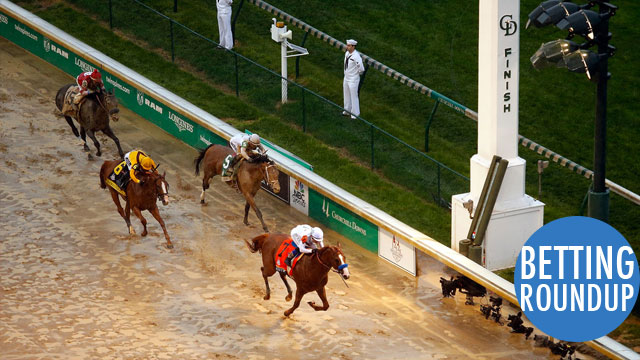A bettor cashed a 300-to-1 futures bet on Justify to win the Kentucky Derby.
In sunny Las Vegas, one bettor won an even more impressive prize: $150,000 from a $500 futures bet on Justify to win the Derby at 300-1, placed all the way back in February at the Wynn.
While not nearly as big as the futures market for mainstream sports such as the NFL or NBA, a futures market does exist for the Kentucky Derby. In this case, one respected bettor was rewarded for his foresight and a call right to the top of the Wynn sportsbook.
“I got a call from a guy I know, a very respected horseman,” Johnny Avello, executive director of Wynn Las Vegas’ race and sportsbook, said on Friday’s VSiN radio broadcast. “He says to me, ‘Johnny, I got a horse I want to bet in the future book.’ I said, ‘I’ll tell you what I’ll do. I’ll give you 250-1.’
“He says, ‘Come on, Johnny.’ I said, ‘I’ll give you 300-1.’ Now he’s sitting 300-1 on Justify at a big number.”
The U.S. Supreme Court hasn’t announced its sports betting legalization ruling yet, but that isn’t stopping New Jersey.
Monmouth Park’s Turf Club hosted what amounted to a celebration of sports betting in New Jersey on Tuesday under the guise of a season-opening news conference, complete with the race track’s signature crab cakes and all the trimmings.
It’s coming, everyone said, the confidence staggering, even though the Supreme Court of the United States heard oral arguments in early December but has yet to issue a ruling on the state’s bid — with Monmouth Park pushing the fight to legalize sports wagering at race tracks and casinos.
William Hill, the betting giant partnering with Monmouth Park on this sure thing, already has sunk another $1 million into what will become the sports book when, not if, a favorable ruling comes down, which could be as early as Monday.
Last month, Pinnacle launched a business-to-business sportsbook platform.
Noted online bookmaker Pinnacle has launched a business-to-business sports betting technology platform service called Pinnacle Solution.
On Thursday, the Malta- and Curacao-licensed Pinnacle announced the debut of Pinnacle Solution, which claims to provide “an unrivalled sportsbook service that allows its partners to utilize Pinnacle’s industry experience and expertise.”
An article published by Recode shows some example of media companies clamoring for legal sports betting.
Media companies have heard versions of this before. But now several of them are optimistic that legalized gambling could be a thing, for real. And they are mulling ways to take advantage.
As Time Inc.’s Sports Illustrated talks to prospective buyers, for instance, it is telling them it could put betting advice and other info aimed at gamblers into a digital subscription package that could eventually generate a substantial minority of the title’s revenues.
Last fall, media investor The Chernin Group launchedThe Action Network, a subscription service aimed at sports bettors. Industry observers believe the startup has plans to capitalize on gambling’s expansion, though the company declined to comment for this story.
And it doesn’t take a lot of work to see the outlines of a legal gambling strategy in Turner’s plans to let NBA fans stream live, in-progress games for a reduced price.
In-game betting — where you wager on the game while it’s being played — dominates the legal market for soccer gambling in the U.K. So it’s easy to imagine a mobile prompt from Turner’s Bleacher Report that doesn’t just tell you that the Celtics-Sixers game has gotten interesting in the fourth quarter, but asks if you want to place a bet.
The NCAA has amended its bylaws on sports betting ahead of potential sports betting legalization.
Previously, student-athletes found to have participated in sports betting were subject to an automatic loss of eligibility, ranging from one season to a complete ban if violators were believed to have attempted to influence the outcome of a game or bet on an event involving their institution. The sanctions could not be appealed.
In late April, the NCAA Division I Council removed that language from the bylaws.
“To promote increased fairness, the committee believes it is important to conduct a case-by-case review of sports wagering violations and also provide an appellate opportunity,” the NCAA legislative committee wrote in its rationale for the amendment.
* * *
Each Friday, we’ll comb through as many articles, tweets and podcasts as we can find related to the world of sports betting and daily fantasy sports, and publish the good stuff here.
Stumble upon something you think we should include? Email [email protected].
